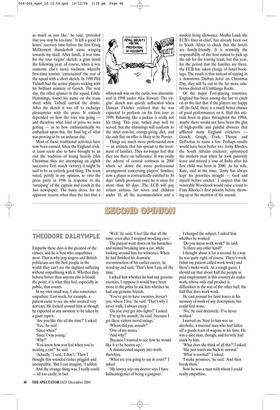Empathy these days is the greatest of the virtues, and
he is best who empathises most. That is why pop singers and British politicians are the best people in the world: they can’t see the slightest suffering without empathising with it. Whether they behave better than anyone else is beside the point; it is what they feel, especially in public, that counts.
In my own small way, I also sometimes empathise. Last week, for example, a patient came to see me who seemed very nervous. He looked around him as though he expected at any moment to be taken by a giant raptor.
‘Are you like this all the time?’ I asked. ‘Yes,’ he said.
‘Since when?’ ‘Since I was young.’ ‘Why?’ ‘You know how you feel when you’re stealing a car?’ he said.
‘Actually,’ I said, ‘I don’t.’ Then I thought this sounded rather priggish and unempathic. ‘But I can imagine,’ I added.
And the strange thing was, I really could — all too easily, in fact. ‘Well,’ he said, ‘I feel like that all the time, even after I stopped twocking cars.’ The patient went down on his haunches and mimed breaking into a car, while looking around him for witnesses. When he had finished his dramatic reconstruction of his earlier career, he stood up and said, ‘That’s how I am, all the time.’ I asked him whether he had any genuine enemies. I suppose it would have been more to the point to ask him whether he had any genuine friends.
‘You’ve got to have enemies, haven’t you, where I live,’ he said. ‘That’s why I never walk, I always creep.’ ‘Do you ever get into fights?’ I asked. ‘I’m up for assault,’ he said, ‘because I get these violent mood swings.’ ‘Whom did you assault?’ ‘One of my mates.’ ‘And why?’ ‘Because I wanted to see how he would like it to be beaten up.’ A disinterested inquiry into truth, therefore.
‘What are you going to say in court?’ I asked.
‘My lawyer says my doctor says I have hallucinogenics of being a gangster.’ I changed the subject. I asked him whether he worked.
‘Do you mean work work?’ he said. ‘Is there any other kind?’ I thought about it for a second. In a way he was quite right, of course. There’s work (what my patient called work work) and there’s make-work. At a rough guess, I should say that about half the people in paid employment in this country do makework, whose only end product is difficulties in the way of the other half, the half that does work work.
He cast around for faint traces in his memory of work of any description, but could find none.
‘No,’ he said decisively. ‘I’ve never worked.’ I moved on. Next to him was an alcoholic, a married man who had fallen off a goods train of wagons in his time. He was a nice man, though, and his wife had stuck by him.
‘What does she think of all this?’ I asked. ‘She just wants me back to normal.’ ‘What is normal?’ I asked.
‘I make promises,’ he said. ‘And then break them.’ Now he was a man with whom I could really empathise.

















































































 Previous page
Previous page